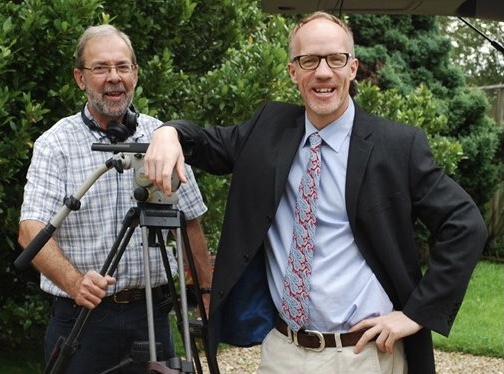Good interview strategy, whether for the media, a job, or even just providing information...
Is to maximise the time you spend talking about areas you're comfortable with and in control of…
And minimise the amount of time where you have to deal with difficult matters.
Cue nostalgic picture from my BBC days with my wonderful cameraman Adie, because in those times I did the questioning not the answering!

I’ve been through a couple of interviews lately.
One from the media about my books and writing.
One for a position teaching a communication course.
I used the technique in both, and it seemed to work well.
Thus, being the kind and caring chap I am, I thought I would share it!
In the radio interview, I was asked why anyone should write a book.
It’s a question I love, because I can answer it with so much heart.
I talk about the remarkable sense of fulfillment when you reach the end, the journey you go on, learning all about yourself, and the world around you…
And, no less importantly, how you get to bore lots of people by pompously recounting the news that you’re writing a book.
(Or maybe that last part is just me.)
But then came a challenging question:
In fairness to the interviewer, it was completely appropriate.
Journalists are not there to smile, nod along and agree with everything you say.
They're supposed to test and explore your arguments, and so came the inquiry:
- But most people who write a book don’t get published, do they?
It was a good question, however true and annoying.
I didn’t like it, because I want to encourage everyone to write a book, it’s such a wonderful experience.
So that question got a short answer.
- I don’t know the statistics, I replied, which was true.
But I can tell you it’s been one of the most incredible experiences of my life, and I can recommend it to anyone.
Which was also true.
Plus had the advantage of dealing with the question, and closing down that part of the conversation in just a few seconds.
On we moved to more positive areas, and all was well.
In the interview for running a course, I was asked why I wanted to spend much of my time teaching.
This could almost have been planted as a question.
There's an answer which I love giving, and goes back to school days.
It’s about two teachers who intervened in my life when I was in danger of going off the rails…
Who turned my world around, without whom I would never have done all the things I have…
And who I admire, revere, and yes, even love for what they did for me.
(Thank you once again, for the umpteenth time, Nigel and Jerry.)
It was a longer answer, but every single one of the interview panel smiled along, was clearly very engaged, and there was one of those lovely silences at the end.
In fact, maybe I pretty much won them over then and there.
The trickier question was about my academic credentials.
Essentially, I don’t really have any.
I’ve never claimed to be academic, just reasonably useful on a practical level.
So that one I closed down fast.
I talked about my experience teaching in a range of places, from universities, to businesses, to government…
My commitment to the art…
And hoped that would excuse my lack of formal academic credentials.
Which apparently it did, happily.
In summary then, an important element of your interview strategy, whatever interrogation you may be facing:
Questions where you can shine require longer answers.
Those which feel full of tricks and traps are best shut down quickly with much shorter responses.


